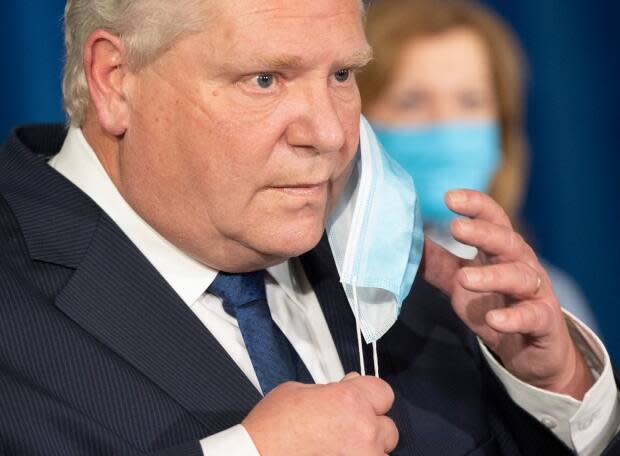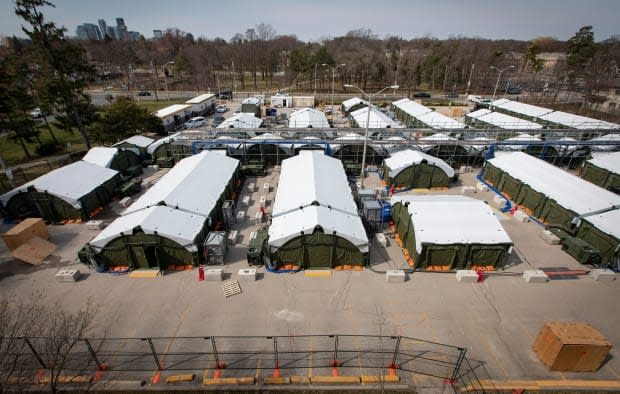Ford announces new restrictions as COVID-19 cases threaten to remain high all summer

Ontario will step up enforcement powers for police and extend its stay-at-home order to a minimum of six weeks in a bid to stem the exponential rise in COVID-19 cases, but won't institute paid sick days — despite modelling showing that cases will remain high through the summer without additional support for essential workers.
Speaking at a twice-delayed news conference on Friday, Premier Doug Ford announced the stay-at-home order first instituted on April 8 for four weeks will now be extended until May 20.
Effective 12:01 a.m. Saturday, outdoor gatherings will be prohibited except for members of the same household or one other person from outside that household who lives alone.
Police will have the authority to ask anyone outside their residence to indicate their purpose for leaving home and provide their address. That includes stopping vehicles and potentially issuing tickets of approximately $750.
Non-essential construction will be shut down and outdoor amenities like golf and playgrounds will be restricted. Retail capacity will be limited to 25 per cent in all settings where in-store shopping is still permitted.
Inspectors will also visit law offices, accounting firms and other such locations to confirm that only essential workers are in the building.
Effective 12:01 a.m. Monday, religious gatherings, weddings and funerals will be limited to 10 people, whether indoors or outdoors. Also beginning Monday, Ford said, there will be checkpoints at provincial borders with Quebec and Manitoba with exceptions for essential travel.
'We're losing the battle'
"I've never shied away from telling you the brutal, honest truth," Ford said. "We're losing the battle between the variants and vaccines ... We're on our heels."
Ford, along with Solicitor General Sylvia Jones, told reporters the stricter measures are necessary because of a lack of vaccine supply. However, health experts have repeatedly said vaccines alone cannot stop the surge of the virus.
"Without stronger system-level measures and immediate support for essential workers and high-risk communities, high case rates will persist through the summer," Ontario's COVID-19 science advisory table said Friday.
The province did say it will boost vaccine supply by 25 per cent in hot spots, but did not provide details on when that boost might take place.
WATCH | Ontario expanding COVID-19 restrictions, tightening borders:
In a statement, the Canadian Civil Liberties Association decried Friday's new measures as "rights slashing by Queen's Park" and suggesting they could lead to a court challenge.
"It's a Black Friday," CCLA executive director Michael Bryant said, adding random police checks are unconstitutional and will result in a "rash of racial profiling."
However, multiple police services in Ontario issued statements Friday saying they are not planning on using the enhanced enforcement measures.
As of Friday night, police in Peel Region, Waterloo, Guelph, Ottawa and Peterborough said they will not conduct random vehicle or individual stops.
Some of their statements echoed a tweet posted by Peel police spokesperson Akhil Mooken, saying officers will instead focus on engaging, explaining, educating and as a last resort, enforcing COVID-19 protocols.
The Toronto Police Service says it is currently reviewing the new orders and that any changes in its enforcement strategy will be communicated to the public.
For its part, the Ontario Provincial Police say they will have members located at inter-provincial points of entry by road to screen all vehicles beginning Monday at 12:01 a.m.
"Those not travelling for essential reasons will be refused entry. There are exceptions for work, medical care, transportation of goods and the exercising of Treaty rights for Indigenous persons," the OPP said in a statement.
The statement also mentions the new enforcement powers that allow officers to ask individuals and motorists who are not at home their purpose for leaving home and to provide their home address.
Meanwhile Unifor, Canada's largest private-sector union, also issued a statement urging the province to legislate paid sick days and fast-track vaccinations for all workers deemed essential.
No worker should be asked to risk their health and their life for their job. - Naureen Rizvi, Unifor
"Workers are scared, and are looking to the province for leadership. Instead, Doug Ford is playing politics amid the crisis, and workers in essential jobs across the province are still waiting to be put on a fast-track to vaccination," said Jerry Dias, Unifor's national president.
The union says it first wrote to the premier at the start of the pandemic in March 2020, calling for the measure.
"Yet as we enter this unprecedented and alarming stage in the pandemic, the provincial government continues to ask essential workers to put themselves and their families at risk," said Naureen Rizvi, Unifor Ontario regional director.
"This is unconscionable, no worker should be asked to risk their health and their life for their job."
Ontario could see more than 10,000 new daily cases by end of May
Ford and his cabinet met late into the evening Thursday and again on Friday morning to consider further COVID-19 restrictions to combat a worsening third wave that is pushing the province's health-care system to the breaking point.
The meeting came ahead of the scheduled briefing from the province's COVID-19 science advisory table, which contained stark new forecasts for the weeks ahead.
Revised modelling suggests Ontario could see more than 10,000 cases per day by the end of May with the current measures in place and 100,000 vaccinations per day.
A six-week stay-at-home order with an average of 100,000 vaccinations per day "is the only way to flatten the curve," the modelling shows.
Additional public health measures could lower cases to about 2,000 cases per day, but that best-case scenario would require considerably stronger measures and increasing vaccinations to 300,000 per day.
Ontario reported 4,812 more cases of COVID-19 this morning, the most ever on a single day, marking three straight days of new peaks. Admissions to hospitals climbed to 1,955, while the number of people being treated for COVID-related illnesses in intensive care rose to 701, both all-time highs since the pandemic began.
According to Critical Care Services Ontario, a government agency that compiles a daily report for hospitals, 74 more people with COVID-19 were admitted to ICUs on Thursday alone, again the highest number ever on a single day in the province.
Public health units also reported the deaths of 25 more people with COVID-19, bringing the official toll to 7,664. The seven-day average of deaths is up to 21.7 per day, a new third-wave peak. The seven-day average for daily deaths reached its highest point of more than 60 in mid-January, before most residents of long-term care and retirement homes had been vaccinated.
Health Minister Christine Elliott said this week that the province is trying to open up hundreds of additional ICU beds in coming days and weeks.
Sources said Ontario intends to make a formal request to the federal government for more than 600 critical care staff to support front-line efforts in hospitals.
"We have received Ontario's draft letter," said Mary-Liz Power, spokesperson for federal Public Safety Minister Bill Blair.
"We are currently in discussions with the province to determine how best we can support them with more resources," she said, adding that the federal government is working closely with all provinces and territories to help support them amid the pandemic.
In Toronto, where the pressure on health-care providers has reached a crisis point, multiple hospitals are preparing for a continued influx of patients in the weeks ahead.
Sunnybrook Hospital, where a field hospital was constructed in a parking lot earlier this month, says it will be prepared to begin accepting patients as early as Monday. The unit has capacity for up to about 80 beds, and a spokesperson for the hospital said it will largely cater to patients who have already been in hospital for some time and their COVID-19 symptoms have subsided.
Transfers to the field hospital will free up critical care beds in the city, the spokesperson said.

Meanwhile, tents are being set up outside the emergency departments of Toronto General and Toronto Western hospitals to limit overcrowding in waiting rooms at the two facilities.
On Thursday night, Prime Minister Justin Trudeau said that he had spoken with the mayors of Toronto, Brampton and Mississauga — cities home to many communities severely impacted by COVID-19 — about further supports that could be available, particularly with respect to vaccinations.
At a news conference in Ottawa this morning, Trudeau added that the Canadian Red Cross is "standing by" to assist Ontario with its mobile vaccination clinics.
WATCH | Ottawa will do 'whatever it takes to help' Toronto with COVID-19: Trudeau
Shortly afterward, Ford's press secretary Ivana Yelich released a statement seemingly rejecting that offer.
"While we appreciate the Prime Minister's offer, unless it is matched with an increase in supply, we do not need the Red Cross at this time for the administration of vaccines in Ontario. We do not have a capacity issue, we have a supply issue."
That's despite Ontario pleading with other provinces Friday to send nurses and other health workers as it buckles under surging COVID-19 infections. In a letter to all provinces and territories, the Ontario government notes it is short thousands of nurses.
This week has seen three major health networks in Toronto temporarily shut down vaccination clinics due to a lack of stable supply.
Public health units collectively administered 115,634 doses of vaccines yesterday, also a new high for the province. As of yesterday evening, a total of 341,933 people have gotten both shots.
Ontario has now used 3,644,038, or 75 per cent, of the 4,852,885 doses of vaccines it has received from the federal government to date. More than 700,000 of those total doses arrived in the province this week.

